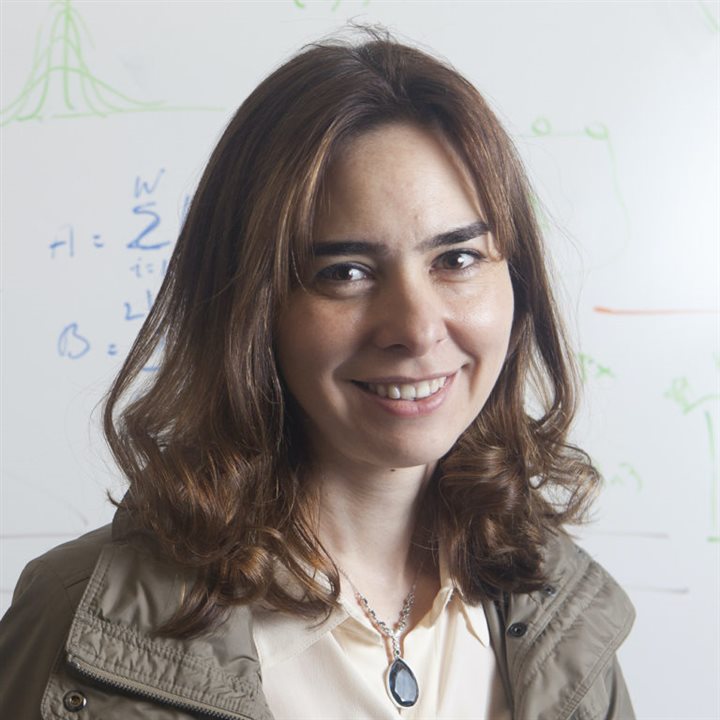Dina Katabi

Dina Katabi's research focuses on wireless sensors, digital health, mobile computing, machine learning, and computer vision. (Image Credit: MIT-IBM Watson AI Lab)
Dina Katabi studied computer science at MIT, earning her Ph.D. in 2003. She serves as the director of the MIT Center for Wireless Networks and Mobile Computing. Katabi also received a 2013 MacArthur Fellowship called the Genius Grant and a 2018 Association for Computing Machinery Prize in Computing.
She developed a wireless device capable of tracking motion. It uses radio signals that travel through walls and deflects off a human body. This technology could have applications in the medical field, allowing doctors to monitor their patient's heartbeat, breathing, and gait from home without relying on sensors. Additionally, AI can help the patient take action, like calling for a medical professional if an emergency occurs or if an elderly person falls. She co-founded Emerald, commercializing the technology.
Radhika Nagpal

Radhika Nagpal develops engineering principles and computational models for self-organizing systems. (Image Credit: Princeton University)
Radhika Nagpal earned her Ph.D. and served as a Postdoc Lecturer at MIT Computer Science and Artificial Intelligence(CSAIL). Nagpal serves as a Professor of Robotics at Princeton University. Before that, she became the Fred Kavli Professor of Computer Science at Harvard University and a founding Faculty Member of the Harvard Wyss Institute for Biologically Inspired Engineering.
Her research focuses on developing engineering principles and computational models for self-organizing systems. Typically, these deal with agents working together to generate complex and robust global behavior. She has explored robotics, computer science, and biology with her work. In one case, she sought inspiration from cardiac cell synchronization for designing wireless networks. She also used social-insect nest-building principles to develop robots that can work together to build large-scale structures and studied the fruit fly wing's tissue architectures.
Katie Weimer

Katie Weimer attended the University of Missouri, where she earned her undergraduate in mechanical engineering and master's degree in mechanical engineering. Weimer uses 3D printing technologies to produce guides, templates, instruments, and implants, helping to revolutionize healthcare. She currently works for 3D systems, leading healthcare operations in Denver and Belgium. Her specialties include 3D-printed medical devices, Virtual Surgical Planning, surgical guides, and templates.
Ramille Shah

Ramillie Shah co-founded Dimension Inx, which 3D-prints and manufactures biomaterials that can help regenerate tissue damaged from injury or illness. (Image Credit: the University of Illinois Chicago)
Ramillie Shah attended Northwestern University, where she acquired her bachelor's degree in materials science and engineering (MSE). She also has a specialty in biomaterials from MIT. Additionally, she serves as the University of Illinois' research associate professor at the Shah Tissue Engineering and Additive Manufacturing Lab. Shah contributes to the biomaterials and tissue engineering fields by creating new tissue and organ engineering biomaterial strategies. She co-founded Dimension Inx, a company that commercializes the 3D-printable material technologies created at her lab. The team is responsible for developing new 3D inks to expand the varying materials compatible with additive manufacturing techniques of direct ink writing.
Melonee Wise

Melonee Wise founded Fetch Robotics, which develops autonomous mobile robots for the logistics sector. (Image Credit: University of Illinois Urbana-Champaign)
Melonee Wise attended the University of Illinois at Urbana-Champaign, where she obtained her bachelor's degree in mechanical and physics engineering and a master's degree in mechanical engineering. From 2014-2021, she served as the founder and CEO of Fetch Robotics, a company providing Autonomous Mobile Robots (ARMs) to the logistics and warehousing sector. Wise is the Vice President and General Manager of Robotics Automation at Zebra Technologies, which develops products and automated solutions for performance optimizations across industries responding in real-time.
She previously worked at Willow Garage, a research and development lab that focused on robotic advancements. She established Fetch Robotics in 2014 with her open-source Robot Operating System expertise and leadership qualities. Since then, Fetch Robotics has expanded and now serves a crucial role in the robotics service industry, making robots easier, faster, and more affordable to deploy in warehouses.
Limor Fried

Limor Fried founded Adafruit, an online platform for those interested in learning electronics. (Image Credit: Adafruit Industries)
Limor Fried attended MIT, where she earned her electrical engineering and computer science (EECS) bachelor's degree and master's degree in EECS. She's an open-source software and hardware pioneer, engineer, and entrepreneur. In 2005, she established Adafruit, an education electronics company that serves as an online platform for anyone interested in learning electronics. Thanks to her leadership skills, the company has over a hundred employees in New York City and provides electronics, tools, and equipment that Fried chooses, tests, and approves for the store.
Christina Koch

Christina Koch made history by joining the first all-female spacewalk in 2019. (Image Credit: NASA)
Christina Koch attended North Carolina State University, where she earned her bachelor's degree in electrical engineering and physics. She served as an electrical engineer at NASA Goddard Space Flight Center's Laboratory for High Energy Astrophysics, contributing to many scientific instruments on missions studying cosmology and astrophysics. In 2018, Koch set a new record for the longest spaceflight by a woman aboard the International Space Station as part of Expedition 59, 60, and 61. She also participated in the first all-female spacewalk with Jessica Meir in October 2019.
Kimberly Bryant

"Kimberly Bryant, Black Girls Code @ SXSW 2016" by nrkbeta is licensed under (CC BY-SA 2.0)
Kimberly Bryant attended Vanderbilt University and earned her electrical engineering bachelor's degree. She founded a training course called Black Girls Code for underrepresented girls in technology careers to learn basic programming skills. Bryant established this course after her daughter became interested in learning how to code. However, the Bay Area course offerings weren't suitable and didn't have many African American females in attendance. So far, Black Girls Code has trained 3,000 girls in seven chapters in the states.
